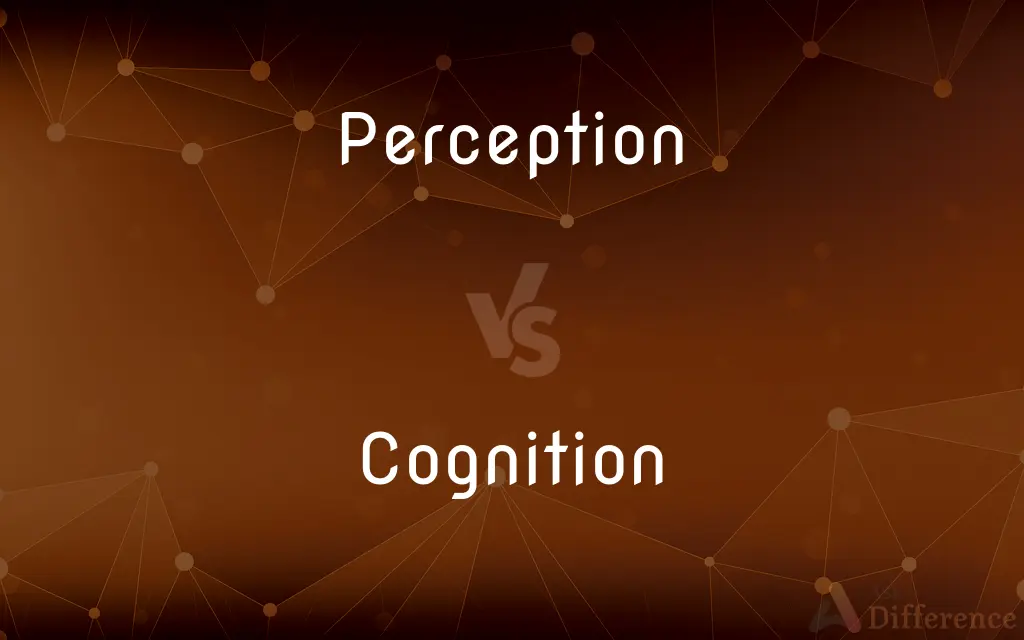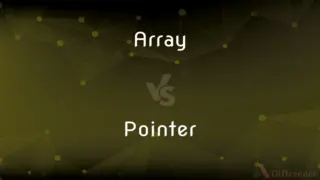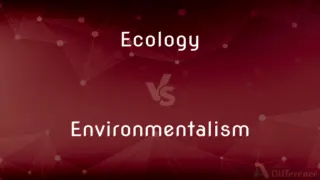Perception vs. Cognition — What's the Difference?
Edited by Tayyaba Rehman — By Fiza Rafique — Updated on November 1, 2023
Perception is the process of sensing our environment, whereas cognition involves thinking, understanding, and processing those sensory inputs.

Difference Between Perception and Cognition
Table of Contents
ADVERTISEMENT
Key Differences
Perception is the sensory experience of the world; it involves the recognition and interpretation of sensory stimuli. Cognition encompasses the mental processes of knowledge, including attention, memory, and problem-solving. Perception is immediate and sensory-based, while cognition requires higher-level brain function.
Cognition refers to the mental action of acquiring knowledge through thought, experience, and the senses. Perception is more about our sensory interpretation of the environment. Every cognitive process starts with perception, but not all perceptions lead to cognitive processing. Perception is foundational to cognition.
Perception can occur without conscious awareness and doesn't necessarily lead to cognition. For example, one might not always be aware of the feeling of clothes against the skin. Cognition, however, is a conscious process and includes reasoning, decision-making, and learning. It involves taking the raw data from perception and turning it into understandable and usable information.
While perception is the first step in the cognitive process, cognition involves complex processes such as learning, language, and thinking. Perception can be tricked, as in optical illusions, but cognition uses those perceptions to form thoughts and opinions. Both are integral to how we interact with our environment.
Comparison Chart
Process
Sensory interpretation of stimuli
Mental processing of information
ADVERTISEMENT
Consciousness
Can be subconscious
Generally requires consciousness
Outcome
Immediate sensory experience
Knowledge, understanding, decision-making
Relation
First step in the cognitive process
Encompasses all higher-level brain functions
Dependency
Relies on sensory organs
Relies on brain's processing abilities
Compare with Definitions
Perception
Intuitive understanding and insight.
Her perception of the customer's needs was uncanny.
Cognition
Higher mental functions, such as judgment and decision-making.
Cognitive development is crucial in early childhood education.
Perception
A way of regarding, understanding, or interpreting something.
His perception of the situation was different from hers.
Cognition
The faculty for processing information, applying knowledge, and changing preferences.
Cognition is key to problem-solving.
Perception
The act of apprehending by means of the senses.
The artist's perception of color is remarkable.
Cognition
The mental action of acquiring knowledge through thought.
Cognition is vital in the learning process.
Perception
A mental image conceptualized from sensory input.
The child's perception of the monster was just a shadow.
Cognition
Intellectual processes involved in gaining understanding.
Her cognition of abstract concepts improved with study.
Perception
Immediate recognition or appreciation, as of aesthetic qualities.
He has a keen perception of beauty in nature.
Cognition
A result of cognitive processes like reasoning or recall.
Memory lapses can indicate cognition issues.
Perception
Perception (from the Latin perceptio, meaning gathering or receiving) is the organization, identification, and interpretation of sensory information in order to represent and understand the presented information or environment.All perception involves signals that go through the nervous system, which in turn result from physical or chemical stimulation of the sensory system. For example, vision involves light striking the retina of the eye; smell is mediated by odor molecules; and hearing involves pressure waves.
Cognition
Cognition ( (listen)) refers to "the mental action or process of acquiring knowledge and understanding through thought, experience, and the senses". It encompasses many aspects of intellectual functions and processes such as: perception, attention, the formation of knowledge, memory and working memory, judgment and evaluation, reasoning and "computation", problem solving and decision making, comprehension and production of language.
Perception
The process of perceiving something with the senses
The perception of a faint sound.
Cognition
The mental action or process of acquiring knowledge and understanding through thought, experience, and the senses.
Perception
An instance of this
Sense perceptions.
Cognition
The mental process of knowing, including aspects such as awareness, perception, reasoning, and judgment.
Perception
The process or state of being aware of something
The perception of time.
Cognition
That which comes to be known, as through perception, reasoning, or intuition; knowledge.
Perception
Insight or knowledge gained by thinking
The perception that inheritance must be coded in DNA.
Cognition
The process of knowing, of acquiring knowledge and understanding through thought and through the senses.
Perception
The capacity for such insight or knowledge
Theories of how to enhance human perception.
Cognition
(countable) A result of a cognitive process.
Perception
An insight or point of knowledge
The article is full of astute perceptions.
Cognition
The act of knowing; knowledge; perception.
I will not be myself nor have cognationOf what I feel: I am all patience.
Perception
An interpretation or impression; an opinion or belief
Doctors working to change the public perception of certain diseases.
Cognition
That which is known.
Perception
The organisation, identification and interpretation of sensory information.
Cognition
The psychological result of perception and learning and reasoning
Perception
Conscious understanding of something.
Have perception of time
Perception
Vision (ability)
Perception
Acuity
Perception
(cognition) That which is detected by the five senses; not necessarily understood (imagine looking through fog, trying to understand if you see a small dog or a cat); also that which is detected within consciousness as a thought, intuition, deduction, etc.
Perception
The act of perceiving; cognizance by the senses or intellect; apperhension by the bodily organs, or by the mind, of what is presented to them; discernment; apperhension; cognition.
Perception
The faculty of perceiving; the faculty, or peculiar part, of man's constitution by which he has knowledge through the medium or instrumentality of the bodily organs; the act of apperhending material objects or qualities through the senses; - distinguished from conception.
Matter hath no life nor perception, and is not conscious of its own existence.
Perception
The quality, state, or capability, of being affected by something external; sensation; sensibility.
This experiment discovereth perception in plants.
Perception
An idea; a notion.
Perception
The representation of what is perceived; basic component in the formation of a concept
Perception
A way of conceiving something;
Luther had a new perception of the Bible
Perception
The process of perceiving
Perception
Knowledge gained by perceiving;
A man admired for the depth of his perception
Perception
Becoming aware of something via the senses
Common Curiosities
Is perception always accurate?
No, perception can be influenced by biases and can be inaccurate.
Are cognition and intelligence the same?
No, cognition is the process of thinking, while intelligence is an overall measure of cognitive ability.
Can cognition affect perception?
Yes, previous knowledge and expectations can shape how we perceive stimuli.
How do learning disabilities affect cognition and perception?
They can affect how information is processed cognitively, but perception may remain normal.
Do perception and cognition develop simultaneously in children?
They develop in tandem but at different rates and through different experiences.
Can perception work without cognition?
Yes, perception can occur without conscious cognitive recognition.
How do perception and cognition interact?
Perception provides the input that cognition processes into understanding and knowledge.
Can experience change our perception and cognition?
Yes, experience is a key factor in shaping both.
Can someone have normal perception but impaired cognition?
Yes, certain conditions can leave perception intact while cognition is affected.
Are there illnesses that solely affect perception?
Yes, disorders like schizophrenia can alter perception.
Do animals have cognition and perception?
Animals have both, but their complexity varies across species.
Is attention part of perception or cognition?
Attention is a cognitive process that often precedes perception.
Can technology enhance our perception and cognition?
Technology can aid perception through devices and enhance cognition with educational tools.
How do psychologists study perception and cognition?
Through experiments, observational studies, and cognitive tests.
Are there exercises to improve cognition and perception?
Mental and sensory exercises can improve both cognitive functions and perceptual skills.
Share Your Discovery

Previous Comparison
Array vs. Pointer
Next Comparison
Ecology vs. EnvironmentalismAuthor Spotlight
Written by
Fiza RafiqueFiza Rafique is a skilled content writer at AskDifference.com, where she meticulously refines and enhances written pieces. Drawing from her vast editorial expertise, Fiza ensures clarity, accuracy, and precision in every article. Passionate about language, she continually seeks to elevate the quality of content for readers worldwide.
Edited by
Tayyaba RehmanTayyaba Rehman is a distinguished writer, currently serving as a primary contributor to askdifference.com. As a researcher in semantics and etymology, Tayyaba's passion for the complexity of languages and their distinctions has found a perfect home on the platform. Tayyaba delves into the intricacies of language, distinguishing between commonly confused words and phrases, thereby providing clarity for readers worldwide.














































